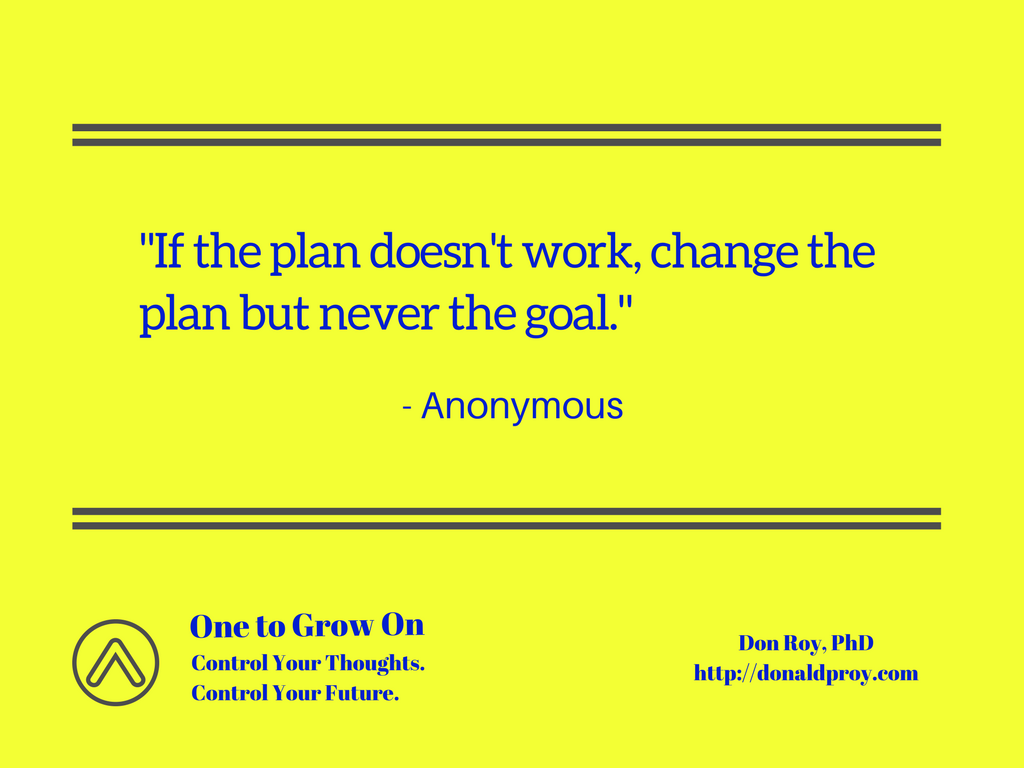
Are you a planner, someone who loves coming up with detailed instructions for completing a project or goal? Plans are essential maps that give direction to reaching a desired destination. Without a map (plan), you might reach where you want to go. However, it will be a trip full of uncertainty, and you might end up somewhere other than the intended endpoint.
Plans are essential for goal achievement. Whether you want to lose 10 pounds or run a marathon, you must have a method for getting to the desired outcome. The problem is we can become discouraged when things do not go according to plan. Before you know it, the weight loss goal has been abandoned or we decide to leave marathon running to others. We let flawed plans dictate a change in goals.
This week, reflect on progress toward goals you have set. If you are not moving toward the goal, the problem could be the plan in place. If the plan is not working, rethink the plan before tossing the goal.
The Plan is the Problem…
Lack of progress toward achieving a goal can be discouraging. You see a path to reach a goal, make a plan for goal achievement, but like a nightmare road trip you never arrive. More times than not, the reason for failure to arrive resides in the plan. Possible shortcomings of the plan include:
- Unrealistic time frame. We underestimate the amount of time needed to effect change or complete tasks needed to reach a goal.
- Lack of knowledge. A plan might be doomed to fail because of not enough information or experience to craft an effective plan. If you want to start a business but have no experience, your launch plan could be incapable of getting your business idea off the ground.
- Lack of support. A plan can be sabotaged by others who are less interested in your goals. They may even want you to fail because success would put you ahead of them.
Or It Could Be the Goal
I embrace the spirit of the idea “change the plan but never the goal,” but it could be a situation where avoiding “never” or “always” applies. It is possible that the goal is the problem. If your goal is actually more like a dream, no plan will help you. The commitment to learn, grow, and even fail is probably not there. Other possibilities for a misguided goal could be:
- It is someone else’s goal. As a college professor, I have encountered many students over the years who selected a major based on their parents’ desires. It is hard to be effective (or happy) when you are pursuing an outcome someone else wants to reach. You have to own a goal to engage in meaningful pursuit of it.
- It does not align with passion. Your goal might arise from a fantasy-like vision. The idea of writing a book or vision of being an entrepreneur are fun to imagine. The work and rejection involved in those pursuits—not so much. Certain aspects of pursuing a goal can be a turn-off, particularly when you do not have a strong emotional attachment to the goal.
- It is the wrong goal. You must acknowledge this possibility. Repeated failure or setbacks could be a sign that you are chasing the wrong thing. For example, if you fail a real estate agent exam once you might benefit from changing your plan. Do you need to study more? Use different prep materials? Meet with a mentor? But, if you fail the exam several times it could mean you are not meant to be a real estate agent.
Not So Fast
It would be naive to always stick with a goal no matter what. Sometimes, goal abandonment or revision is necessary. What this week’s One to Grow On quote encourages us to do is not give up on a goal too quickly. We owe it to ourselves to first determine if changing the plan will overcome a setback in pursuing a goal. While giving up or changing goals can seem like the practical thing to do, it can be the wrong thing to do.
A final thought on adapting plans. A mentor can be invaluable in discerning if the reason you are falling short in goal achievement is the plan or the goal itself. You owe it to yourself to get outside perspective.

